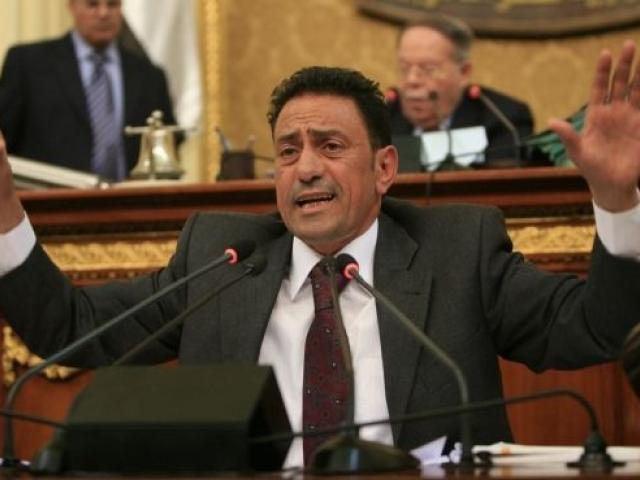
Lawyer Ahmed Abu Baraka demands court recusal and trial before judges who did not order his detention unlawfully
Press Release
The Egyptian Initiative for Personal Rights (EIPR) demands that lawyer and former member of parliament Ahmed Abu Baraka, 64, be granted his legal right to request the recusal of judges who are trying him, and that his trial is held before judges who have not previously considered any of the cases in which he is currently tried. His request comes after the judges trying him extended his detention for longer periods than specified by law and ignored the illegality of his pretrial detention.
The first session of the trial in Case No. 1400 of 2019 (State Security), in which 15 people including Abu Baraka are accused, began before the First Circuit of Terrorism, headed by Judge Mohamed El-Sherbiny, at the Badr Courts Complex on 3 June. Abu Baraka objected to being tried before any of the judges who had previously issued dozens of decisions extending his pretrial detention for more than five years in violation of articles 134 and 143 of the Code of Criminal Procedures. He demanded that those judges be replaced with others who have not considered any of the cases in which he is currently tried.
Abu Baraka has not been able to exercise his right to dismiss the court bench, which is guaranteed by the Civil and Commercial Pleadings Law. His trial was adjourned to 16 June so he can dismiss the court panel, and then adjourned again to 5 July. The court warned that if he does not finalize the procedures of dismissing the court panel before the date of the third session next month, his request will be ruled to lack seriousness.
On 12 June, Abu Baraka was transferred from his place of detention at the Badr 3 Correction and Rehabilitation center to the headquarters of the High Court, to finalize the procedures of dismissing the court panel, without informing his lawyers. He could not file the request as he did not have the required fees. His request to deduct the fees from the funds deposited in his name at his place of detention was rejected.
Abu Baraka was arrested from home in August 2013, and over the course of nearly 12 years of detention, he was charged in five Supreme State Security cases. After the Court of Cassation upheld his acquittal of charges of joining a terrorist group and spreading false news in the first case (No. 59 of 2014- North Giza Court) in 2018, Abu Baraka was not released due to another three-year prison sentence issued against him for "insulting the judiciary" in Case No. 478 of 2014 (Sayeda Zeinab – misdemeanors), and the duration of the sentence was counted from 2017 to 2020. Instead of releasing him, he was "recycled" and interrogated successively in connection with four Supreme State Security cases on charges similar to the original accusation of which the Court of Cassation had previously acquitted him.
Abu Baraka was not released after serving his three-year prison sentence, as the Supreme State Security Prosecution interrogated him in connection with Case No. 1781 of 2019 on charges of joining a terrorist group, and remanded him in custody, until the criminal court decided to release him on 5 August of the same year. Instead of being released, however Abu Baraka was "recycled" again, as the Supreme State Security Prosecution interrogated him in connection with Case No. 786 of 2020 on 8 August 2020, a case in which he is still being held in pretrial detention despite exceeding double the legal maximum limit of pretrial detention set at two years in the Code of Criminal Procedures.
Throughout 12 years of detention, Abu Baraka was moved between four prisons, namely Liman Tora, Tora Mazraa, Tora Maximum Security, known in local media as the "Scorpion Prison", and the Badr 3 Correction and Rehabilitation Center. Since February 2018, he has been denied visits and any communication with his family. Abu Baraka's lawyers had previously noted an obvious deterioration in his health, as he appeared to have severe hearing impairment during the detention renewal hearings held via video conference. In the first session of his trial, which took place in June, and due to the fact that he has been denied visits for more than seven years and deprived of communication with his lawyers during the hearings, the defense team was unable to present Abu Baraka's healthcare requests to the court.
The Supreme State Security Prosecution referred Abu Baraka to trial in connection with three State Security cases, out of four in which he was investigated between February 2020 and January 2025. The first session of his trial was held on 3 June in connection with Case No. 1400 of 2019, in which the State Security Prosecution interrogated him for the first time in December 2024, five years after the case began. His trial in connection with two other cases is yet to be scheduled.
Abu Baraka’s case and his legitimate request to be tried before impartial judges who had not issued dozens of unlawful decisions extending his pretrial detention are not exceptional. Thousands of other defendants were recently referred to trial in connection with dozens of Supreme State Security cases before the two terrorism circuits held at the Badr Courts Complex, the same two circuits that have not issued a single decision to release any detained defendant since their formation in the current judicial year. Both circuits have previously issued thousands of detention renewal decisions in violation of the Code of Criminal Procedures. They extended the detention of persons who did not meet the conditions that the accused must meet to be held in pretrial detention. They also extended the detention of a number of defendants for years exceeding the legal maximum, in hearings that mostly lacked the minimum fair-trial guarantees or even the appearance of due process.



